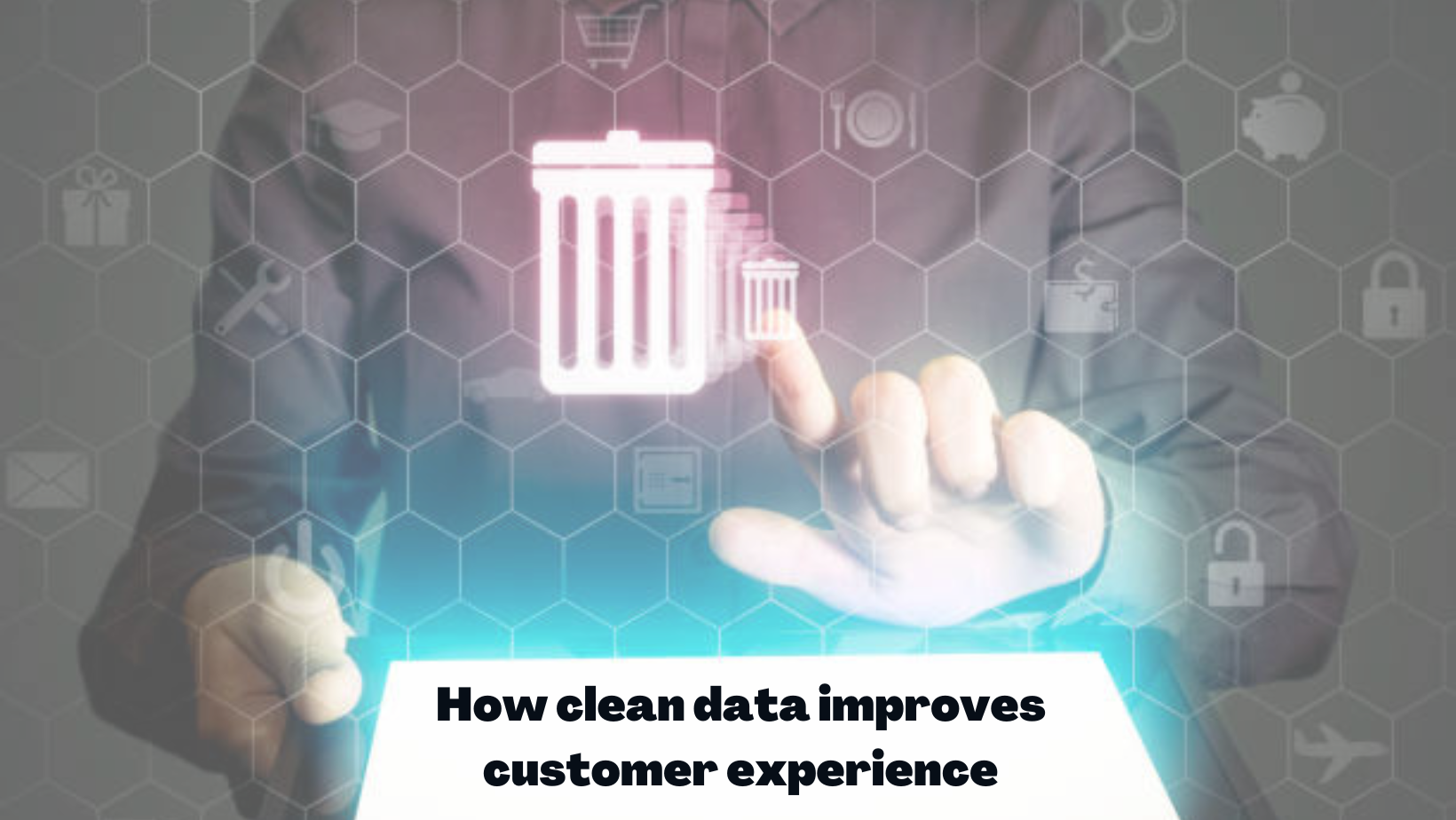
Top 4 ways how clean data improves customer experience
In the digital era, data is considered the foundation upon which virtually every business stands and succeeds. However, the mere existence of a vast database is no longer sufficient. What truly matters is the reliability, consistency, and accuracy of the information it holds. Your extensive database might be of little to no value if the information in its data fields is incomplete, inconsistent, or outdated.
Accurate customer information can enable businesses to tailor their products, services, and interactions according to customers’ preferences, which can significantly impact their experiences. On the contrary, inaccurate data can lead to misguided marketing efforts and irrelevant recommendations, all of which would not add to a satisfied customer experience.
Why is clean data important?
The success of your business hinges on the quality of your data. Insights drawn from clean data facilitate making informed decisions and crafting effective marketing strategies. Inaccuracies and inconsistencies in your data can disrupt these critical functions. For instance, when customer information is inaccurate, it can lead to marketing emails not reaching the intended recipients, resulting in missed opportunities and losing potential customers. This makes the importance of clean data even more profound for every aspect of your customer interactions.
Clean data is essential for several reasons; here’s why:
It is the foundation of informed decision-making
When developing a marketing strategy or expanding into new markets, businesses highly depend on the information in their databases for decision-making purposes. In such scenarios, having accurate and reliable data is of utmost importance. The ability to analyze clean data to derive insights acts as a trustworthy foundation that you can use to make informed decisions.
It streamlines operations
Clean data, with minimal errors and high accuracy, streamlines operations across various industries. For example: In the healthcare sector, having clean data means accurate patient records that enable timely medical intervention. Additionally, in the finance sector, it supports precise risk assessment and investment strategies by providing accurate financial data and eliminating errors in calculation.
Helps you adapt to changing market trends
The business industry is in a constant state of flux. Market conditions change, customer preferences evolve, and unforeseen challenges arise. Businesses can better adjust to these shifts when they possess clean data, which can be analyzed to draw insightful information that can help organizations keep pace with the changing trends.
Facilitates targeted list-building
When customer information is accurate, consistent, and complete, it allows businesses to create highly targeted lists. Using clean data, businesses can segment their customers based on different aspects related to behavior, demographics, etc. This better enables tailoring their marketing campaigns and delivering content that is likely to resonate with the target audience.
The top 4 ways clean data elevates customer experiences
1. Enables personalized customer engagement
Using the insights derived through analyzing clean customer data, businesses can segment their audience effectively and deliver personalized experiences. Businesses can modify their existing marketing strategies or create new ones based on segmented customer lists that highlight the preferences of the target audience.
Result? Customers feel like the brand truly gets them. Here’s how:
Detailed customer profiles
With accurate, up-to-date, and error-free data, businesses can create precise customer profiles that go beyond surface-level insights. Businesses can segment their customers based on these profiles, which include information on their past purchases, browsing history, and demographic details. For instance, businesses can tailor product recommendations based on a customer’s past purchases or suggest content aligned with their browsing history.
Targeted marketing messages
The detailed profiles can be used to send targeted marketing messages to customers. Effective marketing relies on delivering the right message to the right audience at the right time. For example, if a customer has shown interest in outdoor gear, they wouldn’t mind receiving emails featuring the latest hiking equipment or camping gear.
2. Aids in efficient customer support
Efficient customer support is another pillar in providing a great consumer experience. Here’s how clean data impacts it:
Quick issue resolution
Clean and updated data is instrumental in facilitating efficient customer support by providing accurate information about past issues and customer behaviors. Support teams can access this data to provide quick resolutions to customer inquiries. As a result, the resolution time is reduced, and the customer has a smooth experience.
Customized assistance
When customer support agents have access to clean and accurate data, they can offer tailored assistance based on a customer’s past interactions, preferences, and issues. For instance, if a customer contacts chat support with a query about a specific product, the agent can quickly retrieve the customer’s purchase history and browsing behavior to provide targeted product recommendations, address previous concerns or issues, and offer personalized solutions. However, the success of this is subject to the availability of clean and reliable information.
3. Optimizes billing and payment processes
Errors in billing and invoice processing are what trigger customers the most. Here’s how clean data reduces the risk of errors:
Accurate invoicing
The use of clean data for invoice processing facilitates accurate invoicing. Clean invoice data would mean having accurate and error-free details about pricing, quantities, and payment terms. This precision significantly reduces the chances of overcharging or billing discrepancies that can lead to customer complaints. Consumers expect invoices to reflect their actual usage, which can be easily achieved with the utilization of clean data.
Timely and reliable billing
Delays in billing can lead to customer dissatisfaction. Utilizing clean data ensures that billing is prompt and on schedule. This is facilitated by maintaining accurate and up-to-date information related to customer accounts, transactions, and billing details. Further, businesses can effectively track customer payments, invoice issuance, and payment due dates. This accuracy minimizes the chances of billing errors, such as sending invoices to the wrong addresses or miscalculating amounts owed.
Seamless payment processing
Clean data in payment systems ensures accurate processing, which reduces the risk of disputes and late fees. This seamless process instills trust in financial transactions with the business.
4. Builds trust and credibility
Maintaining and updating reliable, clean data often involves obtaining and respecting customer consent for data collection and usage. When consumers note that the use of their information complies with data protection laws and is securely handled to provide relevant and valuable experiences, they are more likely to trust your brand. Two main aspects that add to this are:
Consistency in communication
Clean data ensures that customer interactions are consistent across various touchpoints. When a customer receives conflicting or redundant messages due to data inaccuracies, it can create confusion and frustration. Clean data minimizes these inconsistencies and helps maintain a coherent and trustworthy brand image.
Long-term customer relationships
Trust is of prime importance in building long-term customer relationships. When consumers trust a brand, they are more likely to remain loyal and continue doing business with that brand over time. This way they also feel assured and free of apprehensions, which adds to an elevated customer experience.
How often should you clean your data?
Data should be regularly cleansed to maintain its accuracy and relevance. Although the frequency may vary depending on the volume of data a business uses and manages. However, a general rule is to conduct data cleansing regularly, with intervals ranging from quarterly to annually.
Data cleansing tasks can be performed by in-house experts or with the use of specialized tools. However, maintaining data hygiene in-house can become a daunting task as your data volume grows. This is where seeking data cleansing services from a trusted data service provider can be beneficial for your business. They employ dedicated teams and advanced tools to ensure the quality and accuracy of your data. By outsourcing data cleansing tasks, you can constantly maintain the accuracy of your data without having to struggle with time, costs, and infrastructure-related issues.
Final word
Utilization of clean data for crucial business operations, involving decision-making and strategic marketing, significantly impacts customer satisfaction, from personalized interactions and efficient assistance to building trust and credibility. With this in mind, it can be said that any company that wants to succeed in a customer-centric marketplace will need to make data cleansing an integral part of its data management strategy.



